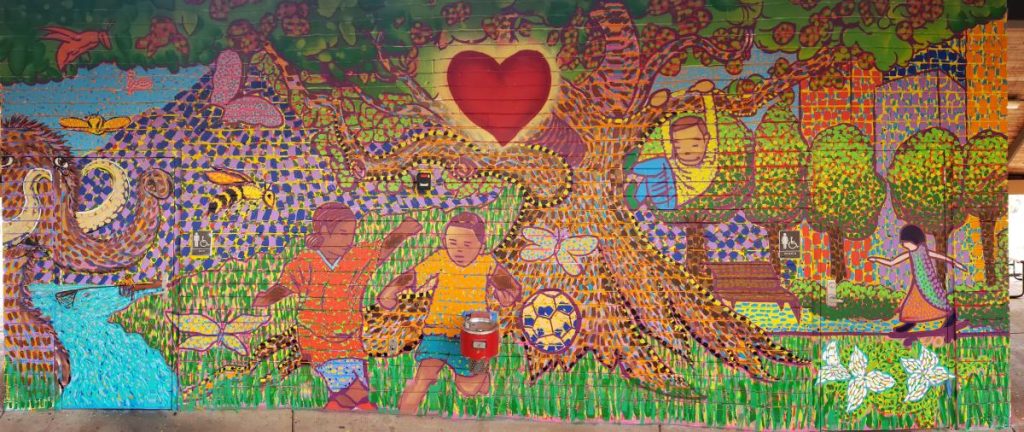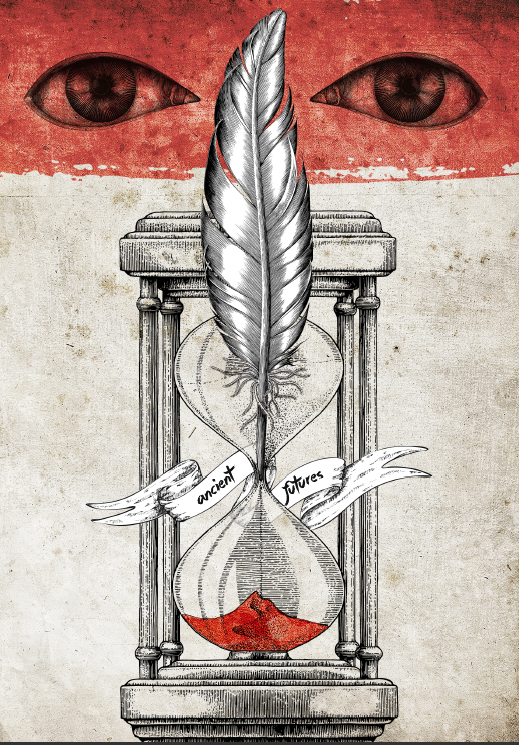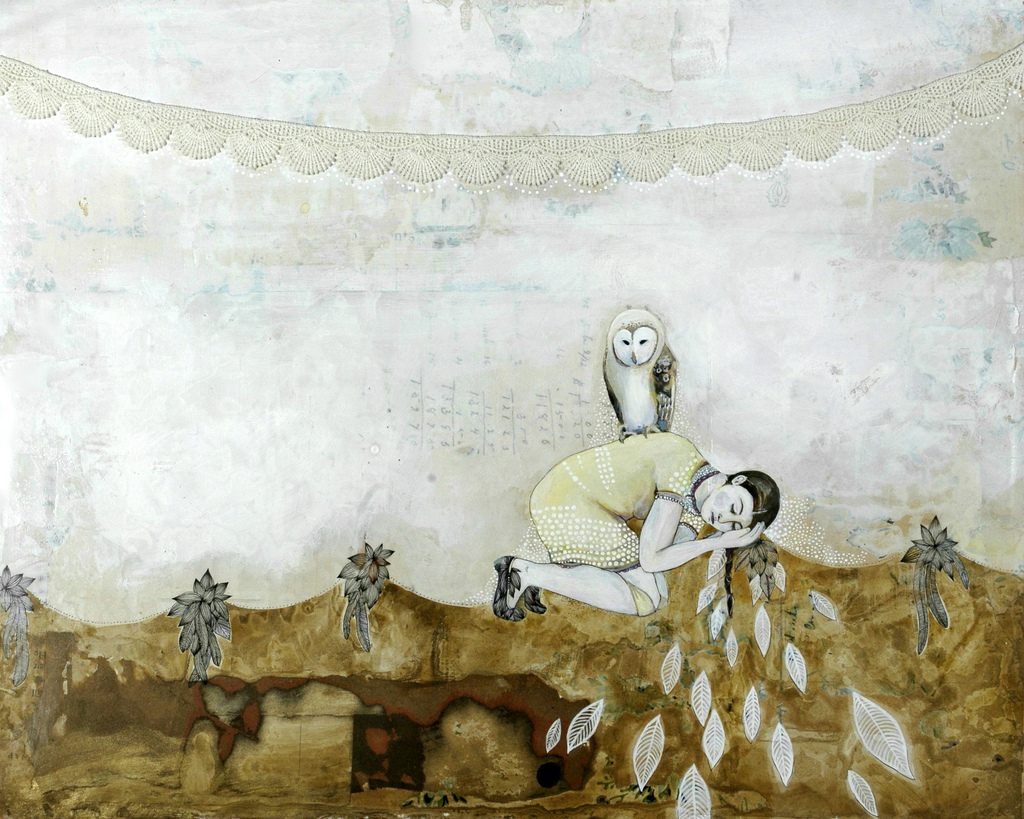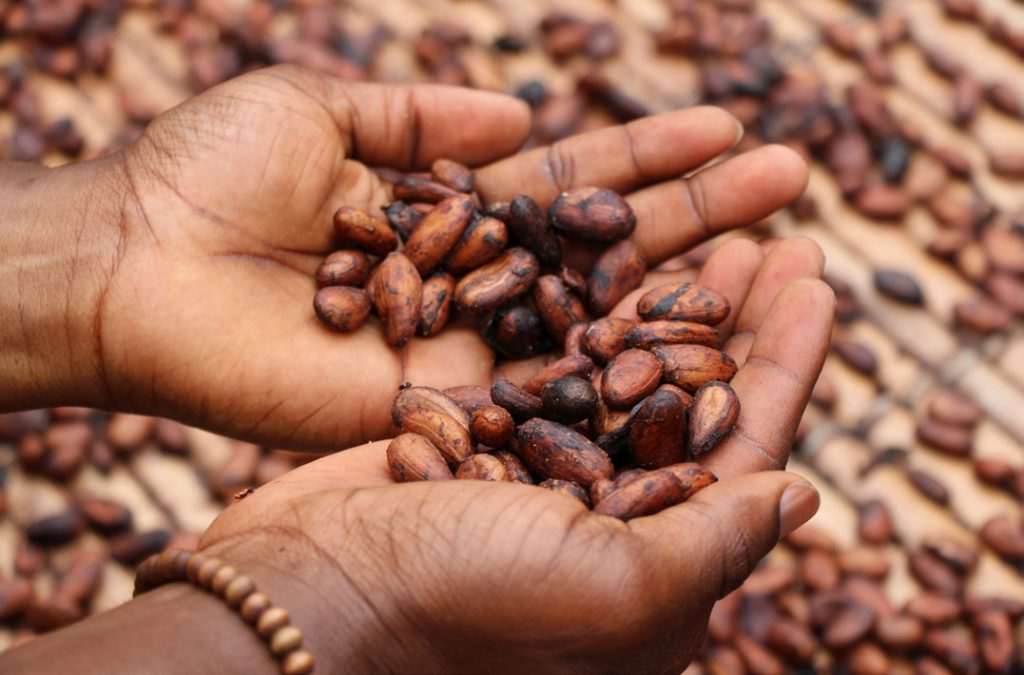Ineffective Rationalism and Effective Alibis | Part 2
featured image | Christine Roy
“Territory is more than just the environment, territory is our whole lives. Our body is the territory and the territory is our body. We should be thinking beyond politics, and think about how we can re-enchant the world again. Awaken our senses. The challenge is to reforest our hearts.” – Célia Xakriabá
As we discussed in part one of this essay, the core of the problem of the Effective Altruism (EA) and Longtermist (LT) worldview is a problem of ontology – our notions of what constitutes reality itself. EA and LT use the same logic of separation from (and mechanization of the natural world) to advance an unfounded faith in techno-fixes, instrumentalized rationalism, and a simplistic worldview in an attempt to influence the current and future priorities of humanity.12
However, this view overlooks the default logic, the ontological foundation of peoples-of-culture, especially Indigenous peoples; namely, we do not exist outside of the Earth’s metabolism. We are embedded in a nested, living ecology. Growing research from Earth systems science to evolutionary biology is demonstrating that the intelligence of plants, insects, trees, mycelium, and other living aspects of the whole are integral and interconnected within a sentient ecology and cosmos.
To find our way out of a centuries of mechanistic, dualistic worldviews, what is required is commensurate alternatives based on notions of a living, regenerative economy and symbiotic approaches to solving the crisis of extreme rationalism, reductionism, and capitalism. We will describe one such alternative as post capitalism.
We use post capitalism as an umbrella concept to better understand what we want to transition out of and transition into. Let’s start with what we seek to transition out of. Capitalism is not simply a system of market exchange. It is a system that measures and reduces the value of Life – including human labor, living ecosystems, relationships and life-force – via a crude system of transactional monetary exchange. It is based on generating and accumulating ever-more commodified surplus value (i.e. more capital) by extracting, separating and abstracting currency from the human and more-than-human world. Capital is primarily created through debt, and therefore requires perpetual growth. Therefore, capitalism is a self-terminating algorithm.
Post capitalism, in contrast, is a life-centric, symbiotic approach. It is not simply another ‘ism’ to replace previous ideologies. Neither is it a euphemism for socialism or anarchism or Nordic capitalism, although it may contain some elements of each. Post capitalism is a conceptual container for social pluralities and systems based on shared values that stem from the shortcomings of the existing system and the lived experience of symbiotic alternatives.13
Let’s take some of the key lines of EA and/or LT thought and put them on a continuum against a post capitalist, life-centric approach. We will explicate each of these points in more detail below.
Effective Altruism / Longtermist |
Post-Capitalist |
|
| Ontology (how we see the world) | Materialist-rationalist-dualist | Animistic-relational-quantum-queer-transrational; non-dual embodiment |
| Ethics (what we should do about it) | Utilitarian, rationalist, reductionist; top-down charity | Ecosystemic, entangled, webs of relations; horizontal solidarity |
| Methodology (how do we go about enacting change) | Positivist, isolated (path dependent) outcomes, abstracted metrics | Dialogue & praxis with humility and reciprocity; address root causes |
| Terrain (where matters) | Somewhere out there | Earthbound; inner-outer mirroring |
| Temporality (when matters) | Distant future; time as arrow progressing into the future | Present; time as cyclical; informed by deep time; constrained by seven generations henceforth and prior |
| Locus of power (who matters most) | Determined by algorithms and evaluations; future digital beings | Humans and more-than-humans, both living and ancestral; both predecessor and progeny |
| Goal (what matters) | Short term fixes and/or longer term colonization of space to make way for future digital beings (and more colonization) | Symbiosis with the living world and cosmos; co-liberation as process rather than destination |
| Epistemology (through what knowledge) | Certainty, exclusion and supremacy; scientific reductionism; monoculture of the mind | Multiple, simultaneous ways of knowing, being, sensing and relating to the world; gesturing towards decolonizing knowledge |
| Impact (who benefits from funding) | Beneficiaries as defined by NGOs, foundations, governments, and elite academics | Address root causes at superstructural, bio-regional, and community levels |
Rather than accepting the first principles that have been handed down to us historically by institutional religions, the state, the media, the high priests of science and the God of the market, there is now a renewed desire (and necessity) to reexamine our gaze, to deepen our understanding of the world, as well as consider our place within it through spiritual-political praxis.
By praxis, we mean a process by which concepts may be enacted, embodied, and realized. By political-spiritual, we are intentionally bringing power, worldviews, and belief systems into consideration. We see examining and engaging in this type of praxis not as something left to philosophers, mystics, religious leaders, Indigenous peoples or activists. It is rather a requirement for being a citizen in troubled times, and especially for those of us who choose to hold responsibility for the transition of unjustly-held wealth and power.
Central to post capitalist philanthropy is a move away from the desires for attribution (e.g. taking credit, seeking legacy) and control (e.g. priorities and theories of change defined and determined by those that have wealth or by those they choose to hire) that characterize the dominant form of philanthropy, to embodied cultures of humble contribution, reciprocity, service, solidarity and cooperation with all beings (human and otherwise) that actually offer their labor in service to the world.

As such, philanthropic institutions cannot simply continue to hold and endlessly grow their financial endowments through the stock market or hedge funds to justify the meager percentage they give to organizations that propound values and approaches they deem important. Rather, philanthropy must endeavor to honor all beings entangled in the creation of new-ancient-emerging cultures and worlds. To truly integrate and metabolize entanglement would require philanthropy abandon the false notions of certainty and control. At a very practical level, this could look like flow funding circles that move resources through trust relationships, the removal of grant applications & milestone reports, and transitioning funds into community-led foundations.
Relatedly, we must shift the philanthropic paradigm from a pseudo-scientific positivist lens which assumes that complex social phenomena can be treated like natural science experiments in a laboratory, measured through abstract metrics and methods like randomized control trials (RCTs), to a dialogic approach. Again, such dialogue requires deep relationality, reciprocity and humility. The aim of philanthropy should be to address the root causes of the meta-crisis through deep relations with those doing the work (e.g. social movements, ecologies, Indigenous peoples, activists, etc.).
Post capitalist philanthropy includes and aims to go beyond the recent efforts to decolonize philanthropy (e.g. practice more trust-based philanthropy, engage in participatory decision making). It includes solidarity economics, mutual aid networks, land back movements, reparations work & ecological restorations, cultural narrative interventions, advancing the commons, bioregional sovereignty & resiliency, as well as the work of supporting experiments in fugitivity and ontological shifts (practicing shifts in the very gaze by which we interact with the world). Those who engage in such work are not driven by narrowly defined metrics and exogenously determined measurements, rather they practice a set of values that include solidarity, cooperation, empathy, reciprocity, interbeing, animism, relationality, co-liberation, and non-commodification.
This approach to philanthropy is as concerned with the what as with the how as with the manner in which the work is approached (what Karen Barad would call onto-ethico-epistemology).14 Many sit in and between multiple worldviews to allow other ways of being and knowing to guide their philanthropy. For example, a Dine elder and her community we know of have recently been gifted (not granted) more than two million dollars to steward the springs and lands at the base of their people’s ceremonial mountain. The vision of the peoples, their on-going rituals and practices, the call of the mountain and the waters guide the transfer of land, the type of organizational forms needed to govern, the ongoing work the wealth holders and landowners need to engage in to step out of default positions of power.
Another example comes from the U.K. where a medium sized foundation recently announced they will abolish themselves in the next few years as they cannot justify the continuation of philanthropy as an extension of colonial capitalism. The article states: “We will relinquish control of our assets, including the endowment and all resources, so that money can flow freely to those doing life-affirming social justice work. We will make space to reimagine how wealth, capital and social justice can co-exist in the service of all life, now and for future generations.”
There are myriad efforts endeavoring to transition out of systems rooted in extraction and ongoing domination and transition towards ones rooted in ecological principles and symbiotic, even anamistic, systems.
We see philanthropy, and indeed all of us concerned with our collective social and ecological wellbeing, at a monumental crossroads. We have to understand the deep antecedents of history; we must fully acknowledge the imperialism, genocide, enslavement, perpetual war, ongoing coloniality, white supremacy and deep inequities of then and now in order to access both the shadow and light of what is happening and what is possible.
 Moreover, we must be informed by deep time, geological time, ancestral time while simultaneously holding our gaze towards adjacent possible futures. Neither naive optimism nor temporal bypassing will get us there. What we do now matters. As Donna Haraway poetically reminds us, “It matters what matters we use to think other matters with; it matters what stories we tell to tell other stories with; it matters what knots knot knots, what thoughts think thoughts, what descriptions describe descriptions, what ties tie ties. It matters what stories make worlds, what worlds make stories.”15
Moreover, we must be informed by deep time, geological time, ancestral time while simultaneously holding our gaze towards adjacent possible futures. Neither naive optimism nor temporal bypassing will get us there. What we do now matters. As Donna Haraway poetically reminds us, “It matters what matters we use to think other matters with; it matters what stories we tell to tell other stories with; it matters what knots knot knots, what thoughts think thoughts, what descriptions describe descriptions, what ties tie ties. It matters what stories make worlds, what worlds make stories.”15
Central to the stories we make are the characters at the center of these stories. We cannot continue with the anthropocentric myth of the human as the pinnacle of evolution, whose offspring, ostensibly billions of digital beings living in computer clouds created by us, already matter more than the 8.7 billion species here on Earth now or that matter more than the eight billion plus humans who are struggling to survive and presently face an event horizon of catastrophic proportions.
We must very quickly transition to an ecosystemic lens in which we are symbionts within a living system and, as our Indigenous elders teach us, we must cast our gaze seven generations hence and prior. We need to start thinking and behaving like good ancestors for all of our relational kin.
What we owe the present
In an interview conducted a few years before his death, the Indigenous scholar, Vine Deloria Jr. responded to the interviewer, Derek Jensen’s question, “What would you say is the fundamental difference between the Western and the indigenous ways of life?” by stating the following:
I think the primary difference is that Indians experience and relate to a living universe, whereas Western people — especially scientists — reduce all things, living or not, to objects. The implications of this are immense. If you see the world around you as a collection of objects for you to manipulate and exploit, you will inevitably destroy the world while attempting to control it. Not only that, but by perceiving the world as lifeless, you rob yourself of the richness, beauty, and wisdom to be found by participating in its larger design.
Scholars, activists, philanthropists and social change practitioners would do well to heed Deloria Jr.’s words. How do we participate in the world’s larger design? As the latest IPCC report reminds us, we are facing discontinuous change and feedback loops the human brain is not evolutionarily equipped to comprehend. We delusionally believe life will go on as it always has. Yet, we also know that the growth/debt based system is a self-terminating logic. Capitalism will implode on its own weight within a generation, taking down much of Life with it. Let us use capital, understanding and metabolizing its historical injustices, to build post capitalist realities, in the short window of time it is still valuable.
Let us build new/ancient/emerging life-centric systems. Let us avail ourselves to the dialogue of the living world and cosmos by declaring who we are and what we value through our actions and an on-going political/spiritual praxis. Let us listen to demands of social movements and the majority world, those who sit and navigate among multiple ontologies, those who intimately know their ecologies, and the wisdom cultures that have sustained our unbroken link to our animate ecologies. Let us create embodied cultures worth living to ensure our communal thriving. Let us abandon rationalist alibis focused on far-fetched future fantasies or myopic shortsighted reformist interventions. We can no longer abdicate our responsibility as citizens and entrust philanthropists, technocrats, billionaires and politicians with the critical task of social change. What we owe the future is what we owe the past is what we owe the present is what we owe each other.
Return to Kosmos Edition 24, Issue 3, Healing Wealth
NOTES
12 The roots of this current ontology of separation that also sees the world as inanimate, as resources to be manipulated, extracted, and/or commodified goes back almost a millenia. The power elites of the time needed to stamp out animate cosmologies across Europe, and then the rest of the world, and to introduce a philosophy of dualistic separation to justify dehumanizing (i.e. slavery, genocide, class warfare, etc.) and to “thingify” and commodify the living world.
13 Some of these values include cooperation, nonviolence, reciprocity, empathy, interconnectedness, solidarity, equity. We have articulated these values and line-of-thought at length in Post Capitalist Philanthropy: Healing Wealth in the Time of Collapse (Daraja Press, 2022; pp. 6-9).
14 Barad goes on to say, “Meeting each moment being alive to the possibilities of becoming, is an ethical call, an invitation that is written into the very matter of being and becoming.” Barad, K (2014). Meeting the Universe Halfway. Duke University Press, p.396.
15 Haraway, D. (2016). Staying with the Trouble: Making Kin in the Chthulucene. Duke University Press, p.12.







